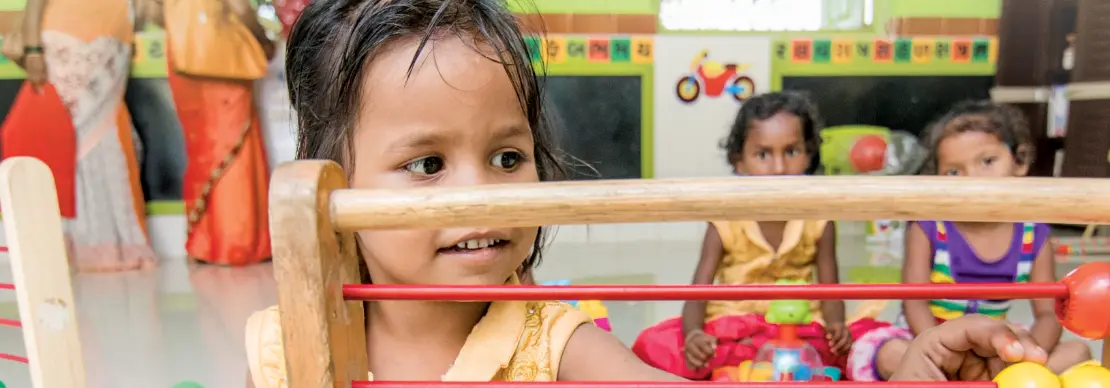
We understand that our business and communities are both evolving, which requires us to develop an adaptive community engagement strategy that addresses the short-term risks and impacts and at the same time caters to long-term expectations of these communities. Our social licence to operate depends on fostering strong bonds with the local communities that were built through our continuous engagement process designed based on the globally recognised principles to cater to their evolving needs. We are committed to providing a lasting, positive contribution to the local communities through our CSR programmes.
To manage our social impact
Adverse financial effects, Conflict due to negative environmental impacts, Reputation loss and jeopardise licence to operate
Integration of a co-creation approach and strengthening our relationship with residents
The extraction, mining, and processing of natural resources, while crucial for advancing technological and infrastructural development, also present significant opportunities for positive community engagement. These activities, which are land-intensive, offer the chance to collaborate with local communities, thereby enhancing their livelihoods and supporting the resettlement process when necessary. Indigenous people and local communities hold a profound connection with the land and water, which are integral to their way of life. While we may not always have full discretion over land choices, it is our responsibility to ensure that our operations are in harmony with the communities we engage with, honouring their cultural heritage, traditional knowledge, and rights. Achieving social licence from the communities around our operations is essential to ensuring uninterrupted, successful business operations. By fostering respectful relationships and driving economic prosperity, we contribute to the well-being and growth of the communities in which we operate.
Our long-term on-site operations require substantial resources and rely on the cooperation of the local population, in addition to local workforce engagement. The welfare of these communities is therefore directly tied to our business success. Our three-pronged social strategy, centred on effective dialogue through open communication and consultation, ensures that we build trust, operate with respect, and share benefits, securing our social licence to operate. Since we share access to natural resources with these communities, it is our responsibility to ensure that they benefit through local employment and procurement opportunities. To foster an environment conducive to growth and welfare, we also organise Community Development Programmes.
At Vedanta, it is our responsibility to foster efficient community relationships through a robust on-site Social Performance Management Team and a systematic Grievance Redressal protocol. To ensure this, each site has a Social Performance Steering Committee (SPSC), governed by the ESG Management Committee established by the ESG Committee of the Board of Directors.
Our metals and mining operations often span remote regions, home to indigenous communities who rely on the land and resources we access. As we grow, we are committed to ensuring that our footprint leaves behind prosperity, not disruption. Through AIM 1: Keep Community Welfare as the Guiding Principle for Our Business Decisions, we embed responsibility into the core of our strategy.
Our relationships with communities are built on trust, consultation, and long-term value creation. We maintain continuous, transparent dialogue to ensure their concerns are heard, addressed, and integrated into our operations. This trust is central to securing our Social Licence to Operate – an essential factor in ensuring sustainable and conflict-free operations.
Our social strategy focusses on upholding human rights and ensuring fair resettlement for communities where we operate, while fostering trust and sharing the benefits of our operations to create long-term, mutually beneficial relationships.
Aim 1 primarily focusses on ‘Do no Harm to Communities’ and ‘Building Trust’ while ‘Benefit-Sharing’ spans across all three aims of our Transforming Communities.
Our communities are not just recipients of support – they are active partners in our growth journey. We champion a benefit‑sharing approach that prioritises local employment, empowers small businesses, and drives holistic community development. In FY 2024‑25, this translated into the creation of thousands of direct and indirect local jobs, support for multiple MSME-led entrepreneurship programmes, impactful healthcare outreach for vulnerable populations, and the implementation of sustainable water infrastructure across high-need regions.
A strong, multi-tiered governance structure ensures that our commitments are not just good intentions but measurable action:
At every site, there is an on-ground implementation team. The structure includes the CEOs of the Business Units, the SPSC and the Social Performance Manager who has the direct control over the implementation. This structure ensures clear accountability, effective delivery, and zero-error execution of welfare initiatives. Vedanta also engages in a transparent and respectful dialogue with indigenous peoples and vulnerable tribal groups, ensuring their rights are respected and their consent is sought before any project or activity that may impact their lands or resources.
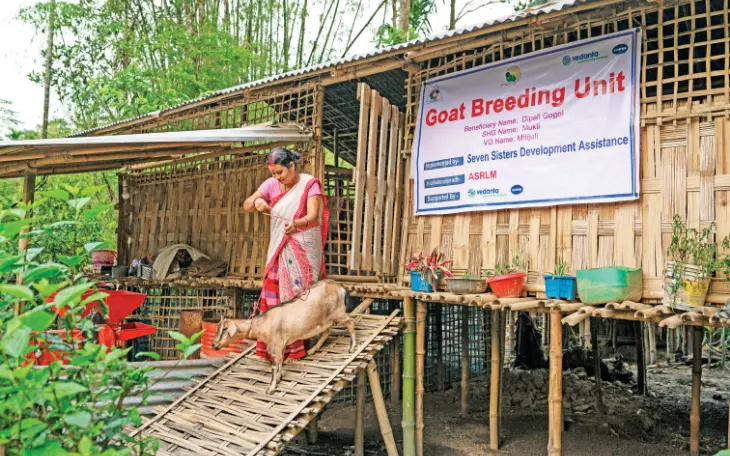
We follow a top-down approach of oversight and implementation of Social Performance.
At Vedanta, the Social Performance Steering Committee (SPSC), alongside the Social Performance Manager (SPM) and Grievance Mechanism Cells, plays a critical role in fostering strong community relationships and ensuring the effective management of social performance. The SPM leads the implementation of social performance principles, while the Grievance Mechanism ensures the systematic and timely resolution of grievances from the host community. This includes conducting thorough investigations of social incidents and addressing them promptly. Additionally, we strategise to promote local procurement and employment, creating positive economic impacts in surrounding areas. The site-level teams take proactive and remedial actions on grievances raised by the community, and our coordinated stakeholder engagement strategy involves collaboration with internal teams such as CSR, External Affairs, and Security, ensuring a unified approach to addressing community concerns and driving sustainable development.
We are aligned with global human rights frameworks and embed these principles into daily operations. Respect for freedom of association, collective bargaining, and indigenous autonomy is non-negotiable. We’ve implemented an equitable grievance redressal mechanism – accessible in local languages and formats – to ensure fair and fast resolution of issues. Feedback loops are integrated to strengthen continuous improvement. We also address complex issues like land acquisition and resettlement with sensitivity and legal compliance, always prioritising community consent and long- term restoration.
Our work under AIM 1 is designed not just for immediate outcomes but for intergenerational transformation. With the right mix of infrastructure, livelihoods, governance, and rights-based engagement, we are helping communities become more self-reliant and resilient. It is a shared growth model, where communities rise with us, supported by sustainable ecosystems and inclusive development.
Site-specific Social Performance Steering Committee (SPSC)
Governance: SPSCs are governed by the ESG Management Committee that reports to the ESG Committee of the Board
To empower host communities by upskilling 2.5 million families
Exploiting a community’s resources without providing proportional socioeconomic benefits may be exposed to actions by host governments and communities that restrict our activities
Focussing on the livelihoods and wellbeing of host communities, and strengthening our relationship with residents, gives the opportunity to tap into local talent for operations
We acknowledge that our projects have far-reaching consequences beyond the duration and site areas in which we operate. The remote locations of our host communities also make certain learning and earning opportunities inaccessible. Throughout the course of our projects, we create and retain local employment and procurement opportunities. However, to create economically resilient communities that can withstand adverse events and sudden changes, empowering skill-development and supporting local enterprises and organisations independent of our operations, is integral. Our CoP as a part of the Corporate Social Responsibility (CSR) Management Committee addresses these issues through the extension of our benefit sharing commitment to providing employment and upskilling opportunities. We also make sure our host communities are replete with additional support for local entities through our community development programmes.
Rooted in our community development philosophy, we aim to empower 2.5 million families with skill‑development and career opportunities by 2030. To achieve this goal, our individual business units have been involved in varied initiatives –
At Vedanta, our presence in remote and diverse geographies brings with it the opportunity and responsibility to enable long-term prosperity. Our second strategic commitment, AIM 2: Empower 2.5 million individuals with enhanced skillsets, is rooted in this ethos. It reflects our belief that real transformation begins when people gain the ability to shape their own futures.
We understand that sustainable development goes beyond infrastructure – it must include capacity building, inclusive education, and skills that generate lasting value. That’s why we integrate structured community engagement into our business strategy, ensuring that our growth is deeply aligned with local aspirations.
India’s CSR mandate under the Companies Act, 2013, aligns seamlessly with our social philosophy. Guided by our CSR Vision “Empowering communities, transforming lives and facilitating nation-building through sustainable and inclusive growth” – we focus on ten thematic areas, including:
These priorities are driven by need assessments and baseline surveys conducted every three years by independent agencies, ensuring we target the most relevant gaps.
AIM 2 is driven by our conviction in the transformative power of skill-building to create lasting change. Across post-mining regions and tribal districts, we focus on equipping youth and women with the capabilities to lead independent, dignified lives. Our Community Skill Centres and livelihood programmes offer vocational training in trades like electrical work, tailoring, and welding, alongside digital and financial literacy, solar PV installation, and entrepreneurship support. These initiatives are tailored to local needs through regular assessments, with special attention to resettlement areas and post-closure sites to ensure long-term economic resilience.
Vedanta is using sports as a catalyst for social transformation, particularly in underserved rural and tribal areas. Our initiatives include developing local sports infrastructure, providing coaching in archery, football, karate, and other disciplines, and creating women-centric coaching centres to challenge gender norms. We also emphasise the inclusion of differently-abled athletes to ensure equal opportunities and preserve cultural heritage through the revival of traditional sports. Sports not only promote mental and physical well-being but also inspire discipline and unity, offering youth a pathway to national platforms and amplifying their potential.
In addition to sports, Vedanta focusses on empowering women and youth by eliminating cultural, financial, and geographical barriers. We offer free skilling modules for women, provide safe and inclusive learning spaces, and create entrepreneurship opportunities for rural youth through mentoring. Our training programmes are aligned with market needs to ensure they are practical and outcome-driven. By addressing unemployment and fostering personal development, we are shaping resilient and empowered communities, equipping individuals to seize future opportunities and achieve their full potential.
The “Community” Community of Practice (COP) implements the CSR action plan with the respective BU CSR teams with oversight provided by the CSR Management Committee (ManCom).
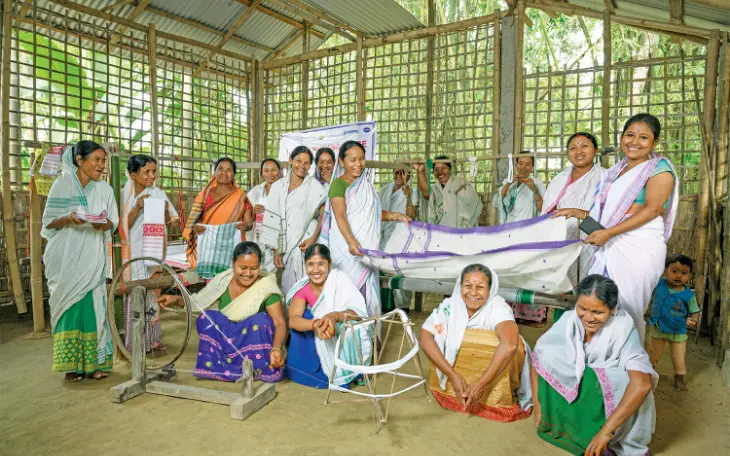
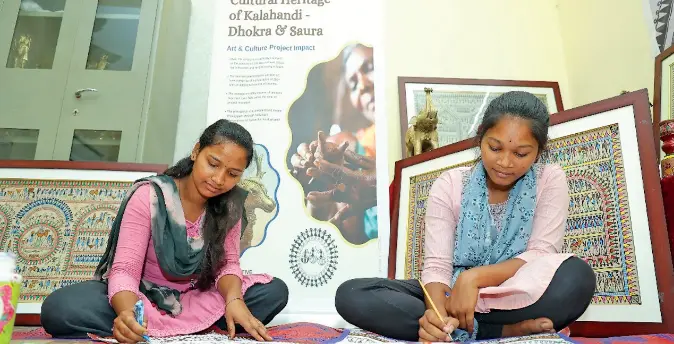
Community Engagement & Development
VAL- Lanjigarh
The initiative reinforces Vedanta's commitment to sustainable, community-centred development, enhancing the company's social licence to operate and promoting long-term local partnerships.
The "Rekindling Dreams" project started in 2019 empowers local artisans through training, exposure to exhibitions, and market access. It helps them achieve financial independence and becomes a role model for others in the community, particularly young girls. The lifetime goal is to train 200+ artisans under the project
This project plays a critical role in fostering economic independence among local artisans, particularly women, by connecting them to markets, preserving traditional art forms, and improving socio‑economic conditions in rural areas. It aims to achieve an average monthly income of ₹ 4,000+ per artisan (currently at ₹ 8,934 per artisan) while promoting self-sustainability and providing exposure beyond state boundaries. Over time, the initiative has successfully established a stable income source for artisans, showcased their work at three exhibitions, and enabled them to independently procure raw materials and market their products. By nurturing artisanal entrepreneurship and empowering communities, the project creates lasting socio-economic impact and preserves cultural heritage.
The project is implemented through the "Adikala" initiative, where local artisans receive resources, support, and opportunities to showcase their work in urban markets. Regular exhibitions and vocational training programmes help artisans gain skills and exposure, leading to sustainable livelihoods.
Local artisans, particularly women, benefit from vocational training, market access, and financial independence, while communities see the preservation of cultural heritage and economic growth. The long-term goal is to move towards rrevival of dying art, artisan empowerment and livelihood enhancement.
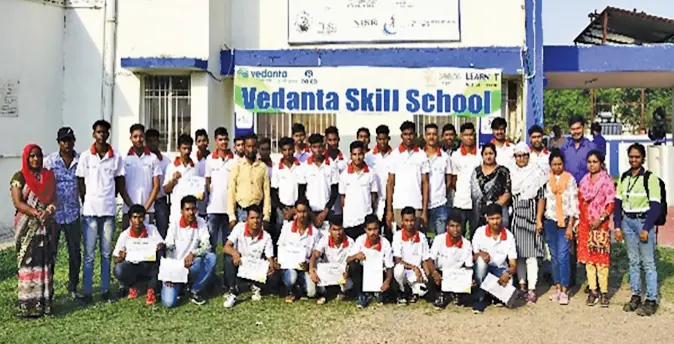
Community Engagement & Development
VAL- Lanjigarh
The Vedanta Skill School project enhances Vedanta's reputation as a socially responsible organisation, fostering community development and contributing to national skill development goals through strategic partnerships.
This project, the Vedanta Skill School, provides vocational training to unemployed youth in various trades, enhancing their employability and socio-economic status through a comprehensive curriculum that includes theoretical and practical skills, life skills, and residential support.
Project Vedanta Skill School with Social Empowerment and Economic Development Society (SEEDS) and Learnet Skills in FY 2024-25, is a transformative initiative aimed at empowering unemployed youth by providing vocational training in trades such as Sewing Machine Operator, Welder, Fitter, Electrical, F&B Steward, and Solar PV Technician. Starting with two trades in Korba, the project expanded to include four additional trades and established new centres in Surguja and Kawardha. Accredited as a 5-star SMART Centre by the Government of India, it is the only centre in Chhattisgarh with multiple certifications from NSDC and SSC, enabling partnerships with organisations like PMKVY, MMKKVY, NABARD, and Generation India. The programme offers hybrid training combining theoretical and practical knowledge delivered by NSDC-certified trainers and provides free residential facilities.
Beyond technical skills, the school focusses on holistic development by teaching life skills such as communication, safety, legal rights, and menstrual hygiene. Since its inception, the project has trained over 13,000 youth, achieving a placement rate of 74%, with 70% retention across nine states. It has empowered SC/ST candidates and ensured opportunities for female students (63% participation), contributing to socio-economic growth and building self-reliance among rural communities. With its convergence model benefiting 40% of trainees through government programmes and private partnerships, the Vedanta Skill School exemplifies a commitment to sustainable development and inclusive progress.
The project is being implemented in partnership with the Social Empowerment and Economic Development Society (SEEDS) and Learnnet Skills. The training includes a mix of government-recognised certifications, placement tracking, and post-placement support.
Vedanta Skill School operates training centres in rural areas, providing students with necessary skills, and placements are arranged in industries that require these specific skills. The project is also supported by multiple government and private organisations, ensuring its credibility and scalability. The programme also places a strong emphasis on tracking post-placement retention and providing necessary counseling to students.
The project empowers over 13,000 unemployed youth by providing them with industry-relevant skills and employment opportunities, thereby improving their socio-economic status and contributing to the overall development of local communities.
To achieve Net Zero carbon emissions across Scope 1 and 2 by 2050
Low-carbon transition introduces regulatory, climate, and technological challenges, with potential asset and market value impacts
Low-carbon shift offers new markets, cleaner technology, and community benefits.
Vedanta’s commitment to community welfare is embodied through its flagship programme, Nand Ghar, which was launched in 2015 with the vision of bridging the gap between urban and rural India. In collaboration with the Ministry of Women and Child Development and local NGOs, the initiative spans across 14 states and has played a key role in supporting national campaigns such as Swachh Bharat, Beti Padhao, Beti Bachao, and Startup India. Nand Ghars are modern Anganwadis equipped with essential facilities such as e-learning modules, solar panels, safe drinking water, and clean sanitation. These centres aim to provide rural mothers and children with access to nutritious food, early learning, and skill development, while also offering women opportunities for entrepreneurship and financial independence through microenterprise incubation.
The Nand Ghar initiative is not only focussed on early childhood education but also aims to address critical gaps in maternal health and nutrition in rural India. With features such as play-based education, nutritious meals, telemedicine services, and skill-building programmes for women, Nand Ghar has been revolutionising rural childhood development. With over 7,500 Nand Ghars across India, including nearly 700 in Rajsamand, Rajasthan, the project is scaling its impact by leveraging strong government partnerships and digital monitoring to ensure sustainability and transparency. By providing disaster-resilient infrastructure and engaging in community health services, Nand Ghar continues to improve the lives of underserved populations.
The Sakhi Initiative is another cornerstone of Vedanta’s community welfare strategy, focussing on empowering women and redefining leadership in rural communities.
The initiative also supports rural microenterprises such as Upaya (Apparel), Daichi (Edibles), and Gauam (Dairy). In addition to economic empowerment, Sakhi enhances digital and financial literacy for women, with 2,500 trained in Chittorgarh alone. By collaborating with India Post Payments Bank (IPPB), Sakhi provides vital banking and insurance services to remote villages, helping drive financial inclusion. Together with Nand Ghar, Sakhi is making significant strides toward fostering self-sustaining, empowered communities across rural India, fulfilling Vedanta’s mission to ensure inclusive, rights-based, and community-led development.
Delivery and outreach occur through modern Rural Mother Anil Agarwal Foundation and Childcare centres or Anganwadi’s which are known as Nand Ghars.
Anil Agarwal Foundation
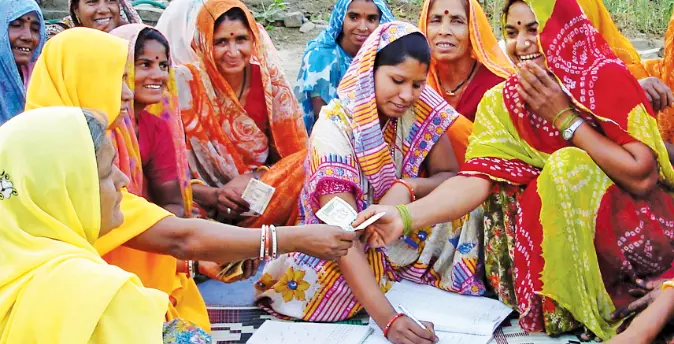
HZL
The Sakhi initiative aligns with Vedanta's broader commitment to empowering communities and promoting social responsibility, contributing to the overall ESG goals of the organisation.
Sakhi empowers 25,455 women, promotes rural entrepreneurship, drives economic inclusion, and fosters social change. The initiative has led to ₹ 22.46 crore in savings, ₹ 11.32 crore in interest, and ₹ 8.4 crore in credit mobilised, benefiting thousands of women across 196 villages.
Sakhi empowers women through Self-Help Groups (SHGs), microenterprise development, financial literacy programmes, and collaborations with financial institutions like India Post Payments Bank. It also raises awareness on social issues through its Uthori theatre group and provides women with access to banking and insurance services.
Sakhi addresses significant social and economic barriers faced by women in rural Rajasthan and Uttarakhand, enabling financial independence, leadership, and self‑reliance. The programme also drives social change, raising awareness on critical issues such as female foeticide, domestic abuse, and child marriage.
Sakhi is implemented through the formation of SHGs, the establishment of federations, and partnerships with banks to provide credit and financial services. It includes training programmes like those for Digital Sakhis in financial and digital literacy, and the operation of the first-ever women-operated BPCL petrol pump in Rajasthan, alongside other initiatives such as the recognition of Sakhi leaders at national platforms like FICCI.